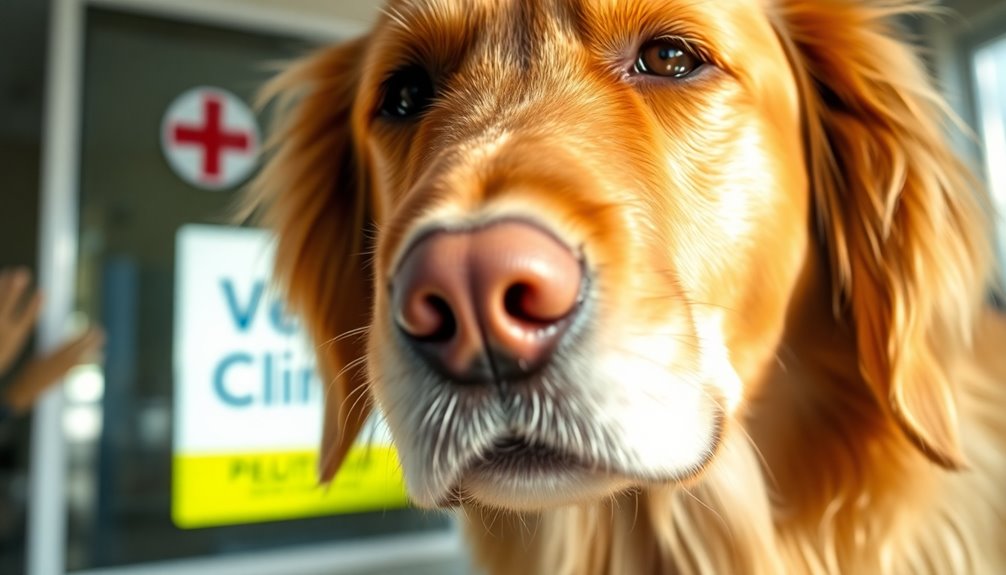If your dog smells like fish, it could be due to anal gland problems, dental issues, urinary tract infections, skin infections, or even their diet. Impacted anal glands often cause strong odors, while poor dental hygiene leads to bad breath. UTIs can result in fishy-smelling urine, and skin infections, especially yeast, create unpleasant scents. Finally, fish-based foods might also be the culprit. Keep an eye on these factors, and you'll discover effective fixes to keep your pup smelling fresh.
Key Takeaways
- Anal gland problems can cause a fishy smell; regular expression can help prevent issues.
- Dental issues, like periodontal disease, may lead to foul breath; maintain oral hygiene with brushing and vet cleanings.
- Urinary tract infections (UTIs) often produce fishy-smelling urine; consult a vet if you notice changes in urination.
- Skin infections, particularly yeast infections, can create strong odors; a vet can provide appropriate treatments.
- Dietary changes, such as fish-based foods, may contribute to odors; monitor and adjust your dog's diet as needed.

When you notice an unpleasant odor coming from your dog, it can be concerning, especially if you're unsure of the cause. One common culprit behind a fishy smell is anal gland problems. Dogs have two small glands located near their anus that can become impacted or infected. When this happens, you might notice a particularly strong odor, especially during bowel movements.
If your dog seems to be scooting or licking their rear more than usual, it's a good idea to consult your vet. Regular anal gland expression can help prevent issues and keep your dog smelling fresh.
Another potential source of that fishy scent is dental issues. Poor oral hygiene can lead to periodontal disease or even tooth root infections, both of which can produce a foul odor in your dog's breath. If your dog's breath smells fishy, it's time to reassess their dental care routine.
Regular brushing, dental chews, and veterinary cleanings can go a long way in maintaining good oral hygiene and preventing bad breath.
Don't overlook urinary tract infections (UTIs), especially in female dogs. These infections can result in fishy-smelling urine, often accompanied by frequent urination or signs of discomfort.
If you notice your dog is urinating more often or straining, it's crucial to see your vet. They can diagnose the issue and recommend treatment, which may include antibiotics. Addressing UTIs can't only relieve your dog's discomfort but also eliminate that unpleasant odor.
Skin infections can also be a significant source of fishy smells. Yeast infections, in particular, are notorious for creating a strong odor and are often found in areas that retain moisture, like the paws or folds of skin.
If your dog frequently scratches or licks certain areas, they may have a yeast infection or another skin issue. A trip to the vet can help determine the cause and appropriate treatment, which may include medicated shampoos or antifungal medications.
Dietary changes can also play a role in the smells you associate with your dog. If you've recently introduced fish-based foods or treats, they could be contributing to that fishy scent.
It's essential to monitor your dog's diet and adjust it if you notice any unpleasant odors. Sometimes, switching to a different food brand or formula can make a noticeable difference.
Ultimately, addressing any underlying health concerns is crucial for your dog's overall well-being. If the fishy smell persists despite good hygiene practices, make sure to consult your veterinarian.
They can help identify any underlying health issues and recommend appropriate treatments to keep your dog healthy and odor-free. By staying vigilant and proactive, you can ensure your furry friend remains happy and fresh-smelling.
Frequently Asked Questions
How Do I Get My Dog to Stop Smelling Like Fish?
To get your dog to stop smelling like fish, start by bathing them regularly with a gentle pet shampoo.
Regularly express their anal glands, especially if they're prone to issues.
Maintain a balanced, fiber-rich diet to support healthy bowel movements.
Don't forget to keep up with dental hygiene by brushing their teeth and using dental chews.
Finally, schedule routine vet check-ups to monitor for any underlying health issues contributing to the odor.
Will My Dog's Fishy Smell Go Away on Its Own?
Imagine a stormy sea; your dog's fishy smell is like the thunder warning you of trouble ahead.
No, your dog's fishy scent won't just vanish on its own. It's often a sign of underlying issues that need attention.
Whether it's a dental problem or a skin infection, ignoring it won't help.
You'll need to consult your vet to uncover the cause and get your furry friend back to their fresh, happy self.
How Do You Fix Fishy Dog Breath?
To fix your dog's fishy breath, start by brushing their teeth regularly to remove food particles and plaque.
Consider professional dental cleanings to tackle any severe issues. You can also provide dental chews or toys that promote oral hygiene.
Keep an eye out for signs of oral health problems, and think about using a dental rinse or water additive to reduce bacteria.
These steps can help ensure your pup's breath stays fresh.
Why Does My Dog Suddenly Smell Like Rotten Fish?
If your dog suddenly smells like rotten fish, it might signal an underlying issue.
You should check for anal gland problems, as they often produce foul odors when impacted or infected.
Dental health is another concern; periodontal disease can cause bad breath that resembles fish.
Additionally, skin infections or dietary changes, especially if you've introduced fish-based foods, can contribute to this unpleasant smell.
It's best to consult your vet for a thorough evaluation.
Conclusion
In conclusion, if your dog smells like fish, it's often a sign of underlying issues that need attention. Just like a storm cloud signals rain, an unusual odor can point to skin infections, dental problems, or dietary concerns. By addressing these causes, you can restore your pup's fresh scent and overall well-being. So, don't let that fishy smell linger—act now to ensure your furry friend stays happy and healthy!










